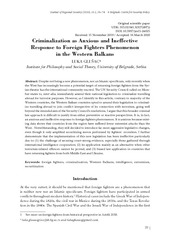Criminalization as Anxious and Ineffective Response to Foreign Fighters Phenomenon in the Western Balkans
Чланак у часопису (Објављена верзија)
Метаподаци
Приказ свих података о документуАпстракт
Despite not being a new phenomenon, nor an Islamic specificum, only recently when the West has increasingly become a potential target of returning foreign fighters from the Syrian theater has the international community reacted. The UN Security Council called on Member-States to, inter alia, immediately amend their national legislation to criminalize travelling abroad for terrorist purposes. However, as I identify in this article, contrary to majority of the Western countries, the Western Balkan countries opted to amend their legislation to criminalize travelling abroad to join conflict irrespective of its connection with terrorism, going well beyond the intended aim of the Security Council’s resolutions. I argue that this broader criminal law approach is difficult to justify from either preventive or reactive perspectives. It is, in fact, an anxious and ineffective response to foreign fighters phenomenon. It is anxious because existing data shows that countries from the region have su...ffered fewer extremist attacks than the West. Notwithstanding, they still decided to introduce far more aggressive legislative changes, even though it only amplified securitizing moves performed by fighters` recruiters. I further demonstrate that the implementation of this new legislation has been ineffective particularly due to: (1) the challenge of securing court-strong evidence, especially those gathered through international intelligence cooperation; (2) its application mainly as an alternative when other terrorism-related offences cannot be proved; and (3) biased law application in countries that have returning fighters from both Middle East and Ukraine.
Кључне речи:
foreign fighters / criminalization / Western Balkans / intelligence / extremism / securitizationИзвор:
Journal of Regional Security, 2020, 15, 1, 39-74Издавач:
- Belgrade Centre for Security Policy
Финансирање / пројекти:
- Министарство науке, технолошког развоја и иновација Републике Србије, институционално финансирање - 200025 (Универзитет у Београду, Институт за филозофију и друштвену теорију) (RS-MESTD-inst-2020-200025)
Колекције
Институција/група
IFDTTY - JOUR AU - Glušac, Luka PY - 2020 UR - http://rifdt.instifdt.bg.ac.rs/123456789/2210 AB - Despite not being a new phenomenon, nor an Islamic specificum, only recently when the West has increasingly become a potential target of returning foreign fighters from the Syrian theater has the international community reacted. The UN Security Council called on Member-States to, inter alia, immediately amend their national legislation to criminalize travelling abroad for terrorist purposes. However, as I identify in this article, contrary to majority of the Western countries, the Western Balkan countries opted to amend their legislation to criminalize travelling abroad to join conflict irrespective of its connection with terrorism, going well beyond the intended aim of the Security Council’s resolutions. I argue that this broader criminal law approach is difficult to justify from either preventive or reactive perspectives. It is, in fact, an anxious and ineffective response to foreign fighters phenomenon. It is anxious because existing data shows that countries from the region have suffered fewer extremist attacks than the West. Notwithstanding, they still decided to introduce far more aggressive legislative changes, even though it only amplified securitizing moves performed by fighters` recruiters. I further demonstrate that the implementation of this new legislation has been ineffective particularly due to: (1) the challenge of securing court-strong evidence, especially those gathered through international intelligence cooperation; (2) its application mainly as an alternative when other terrorism-related offences cannot be proved; and (3) biased law application in countries that have returning fighters from both Middle East and Ukraine. PB - Belgrade Centre for Security Policy T2 - Journal of Regional Security T1 - Criminalization as Anxious and Ineffective Response to Foreign Fighters Phenomenon in the Western Balkans IS - 1 VL - 15 SP - 39 EP - 74 DO - 10.5937/jrs15-24025 ER -
@article{
author = "Glušac, Luka",
year = "2020",
abstract = "Despite not being a new phenomenon, nor an Islamic specificum, only recently when the West has increasingly become a potential target of returning foreign fighters from the Syrian theater has the international community reacted. The UN Security Council called on Member-States to, inter alia, immediately amend their national legislation to criminalize travelling abroad for terrorist purposes. However, as I identify in this article, contrary to majority of the Western countries, the Western Balkan countries opted to amend their legislation to criminalize travelling abroad to join conflict irrespective of its connection with terrorism, going well beyond the intended aim of the Security Council’s resolutions. I argue that this broader criminal law approach is difficult to justify from either preventive or reactive perspectives. It is, in fact, an anxious and ineffective response to foreign fighters phenomenon. It is anxious because existing data shows that countries from the region have suffered fewer extremist attacks than the West. Notwithstanding, they still decided to introduce far more aggressive legislative changes, even though it only amplified securitizing moves performed by fighters` recruiters. I further demonstrate that the implementation of this new legislation has been ineffective particularly due to: (1) the challenge of securing court-strong evidence, especially those gathered through international intelligence cooperation; (2) its application mainly as an alternative when other terrorism-related offences cannot be proved; and (3) biased law application in countries that have returning fighters from both Middle East and Ukraine.",
publisher = "Belgrade Centre for Security Policy",
journal = "Journal of Regional Security",
title = "Criminalization as Anxious and Ineffective Response to Foreign Fighters Phenomenon in the Western Balkans",
number = "1",
volume = "15",
pages = "39-74",
doi = "10.5937/jrs15-24025"
}
Glušac, L.. (2020). Criminalization as Anxious and Ineffective Response to Foreign Fighters Phenomenon in the Western Balkans. in Journal of Regional Security Belgrade Centre for Security Policy., 15(1), 39-74. https://doi.org/10.5937/jrs15-24025
Glušac L. Criminalization as Anxious and Ineffective Response to Foreign Fighters Phenomenon in the Western Balkans. in Journal of Regional Security. 2020;15(1):39-74. doi:10.5937/jrs15-24025 .
Glušac, Luka, "Criminalization as Anxious and Ineffective Response to Foreign Fighters Phenomenon in the Western Balkans" in Journal of Regional Security, 15, no. 1 (2020):39-74, https://doi.org/10.5937/jrs15-24025 . .



